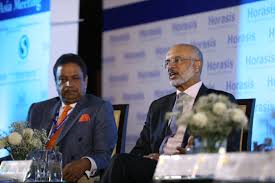Indian policymakers need to be more pragmatic on data localisation: DBS CEO Gupta
Then, we have to make sure that we understand that free flow of data to and fro is going to be critical," Gupta said while speaking at the Global Business Summit here. It is hard to anticipate a world where India insists on no data moving out but wants other countries to use it as a hub for information processing, he said, adding that there can be many services where Indian companies can use artificial intelligence and machine learning-based tools to render services to the outside world.

- Country:
- India
Processing of information presents a lucrative opportunity for India just like information technology in the past and Indian policymakers need to be more "thoughtful and pragmatic" on data localization, Singaporean lender DBS's chief executive Piyush Gupta said on Wednesday. India-born Gupta said countries become very "uncomfortable" to deal with a jurisdiction where the free inflow of data is allowed but the same is not reciprocated and also termed the Indian policy-making approach as one of "shooting own goals".
The comments come at a time when India has been barring companies from moving data outside the country and has laid out strict rules on localization, especially for the financial services sector. "Data nationalism is not just an Indian phenomenon. However, we are going to see this (information processing) as a huge possibility for the country. Then, we have to make sure that we understand that free flow of data to and fro is going to be critical," Gupta said while speaking at the Global Business Summit here.
It is hard to anticipate a world where India insists on no data moving out but wants other countries to use it as a hub for information processing, he said, adding that there can be many services where Indian companies can use artificial intelligence and machine learning-based tools to render services to the outside world. "We need to be a lot more thoughtful and pragmatic about what our data policies are, what needs to be onshore, how we can leverage on the free flow of data," he said.
"I think a lot of countries and firms are uncomfortable with one way traffic that data needs to move into a country but can't move out of the country. That's clearly something the government needs to think a lot about," Gupta noted. As a prescription, Gupta suggested a better policy would be to say that one set of data must be stored onshore and allow firms and companies who need to use it to aggregate at a global level to ship it out as well.
Gupta said India can become home for more manufacturing capacity which is right now moving out of China as part of the global supply chain rebalancing but stressed on the need to have a single agency that can help a potential investor deal with the difficulties. He said Indian labor productivity levels are also not as high as in China, which makes it necessary to devote attention to the issue through interventions, including re-skilling people.
DBS wants to expand its consumer-facing business in India and opted to establish a local subsidiary because of the same, he said, adding that the lender will be cautious on retail lending in the next few months.
(This story has not been edited by Devdiscourse staff and is auto-generated from a syndicated feed.)
- READ MORE ON:
- Piyush Gupta
- India
- DBS
- Singaporean
- China
ALSO READ
Senior US treasury officials to urge India to maintain implementation of Russian oil price cap
Indian Navy hands over nine pirates to Mumbai Police
Pakistan Volleyball Federation invites India for tournament in Islamabad
Senior US treasury officials to urge India to maintain implementation of Russian oil price cap
Mayank Yadav can be fast-tracked into international cricket, India have got something special: Broad










